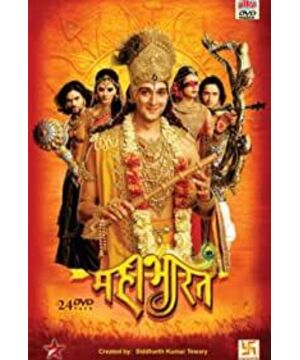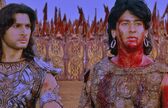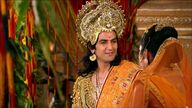On August 10, Baba advised Mandhi:
Never judge a perfect person from external performance and actions. Lord Krishna not only asked Arjuna to go to war and kill relatives, but even inspired him to use violence. Killing a mad dog is actually mercy. This allows it to avoid the associated kamma caused by biting, which would seriously hinder its evolution. To kill this mad dog is to help it evolve.
...
the next day, July 18, in the dining room of the villa, Baba explained the work of Avatar, citing an incident of Krishna and Arjuna in the Mahabharata:
Krishna ordered Arjuna to kill The Kuru people, Arjuna hesitated at first, then refused, and asked Krishna, "How can I kill my own brother?" Krishna opened his mouth and told Arjuna to look in. Arjuna saw Kṛṣṇa mouthing the whole universe, including the Kuru people who appeared and disappeared like millions of clouds. This convinced Arjuna of Krishna's power, and he went into battle, killing countless enemies.
This event gave Arjuna complete confidence in Krishna. Krsna then showed him his cosmic body, including all animate and inanimate forms. This view is called Virata Dashan—the great view. But this is not really good. Just dharma to the master's cosmic body. Avatar also has a cosmic heart to which all individual hearts in the universe are connected.
From this you will know that even the master's closest disciples misunderstand his work. To convince and give them confidence, the masters had to resort to miracles. This is why Krsna does this.
…
Some people asked why Jesus didn’t marry. Baba gave a detailed explanation:
Avatar's external way of life was determined by the customs and customs of his time, and he adopted the attitude that was most suitable as a role model for his contemporaries. But essentially, all Avatars embody the same ideal of life.
In the time of Zoroaster, humanity was indecisive and lacking balance. The Persians of that time were neither outright materialists, nor really aspired to aura. He taught them to be competent heads of households, to marry, not to covet other people's wives, and to worship God. His own life is based on this principle: good thoughts, good words and good deeds. Zoroaster married and had a family.
During the Krishna era, Hindus fought in civil war. Jealousy and greed prevail, and the true concepts of spiritual life and love are unknown. Kṛṣṇa bases his spiritual teachings on the laws of love, purity, and innocent entertainment. The ideal of unselfish love that guides human beings happily.
In the time of Buddha, Indians were deeply immersed in material things. To show that their values were wrong, that they were victims of Maya, the goddess of illusion, the Buddha abandoned his wife, family and worldly wealth to base his teaching on renunciation.
In Muhammad's time, Arab tribal men were very sexual, and cohabitation with several wives was not considered bad or illegal. If Muhammad, like Jesus, did not marry and advocated celibacy, or even if he imposed absolute restraint, there would be a dangerous reaction. Few would follow his teachings, and even fewer would be drawn to this ideal. Muhammad had six wives, but he had no physical contact with them.
Arrogance and cruelty were the hallmarks of the masses in Jesus' day. But they have a fair view of women and marriage; therefore, there is no need, as in Arabia, to set an example of marriage. Jesus lived a humble, simple, poor life, enduring suffering in order to lead mankind to the purest ideal—the Beloved God.
Avatars have manifested in different times, and their teachings must therefore be in line with the psychology of their times. Sometimes Avatar's teachings are based on the search for a personal God, other times it is based on a search for impersonal gods.
It's like in a hospital, patients say they are thirsty at different times. For those who are thirsty in the morning, the doctor prescribes tea or coffee, water or juice in the afternoon, skim milk in the evening, and warm milk before going to bed. The doctor is the same, the thirst is the same, but the way of quenching the thirst is different at different times and different conditions.
God appeared as Avatar at different times and quenched human thirst in different ways. Everyone, consciously or unconsciously, has the same desire for truth. . . . Zoroaster gave the Charyad to the masses, because in those days they could understand good thoughts, good words, and good deeds
.
He didn't say it outright: "Act regardless of the outcome" - because they couldn't accept it. So Zoroaster said the same thing in a different way.
Muhammad said: "Just concentrate on action. Do good and go to heaven; do evil and go to hell."
Krishna said: "Action, but don't care about the result. Give me the result." - Why? Because the atmosphere at the time was very warlike.
Jesus also said: "Act, but with sacrifice."
These teachings given by Avatar are based on the urgent needs of the time.
——"Master Meihe"
View more about Mahabharat reviews









